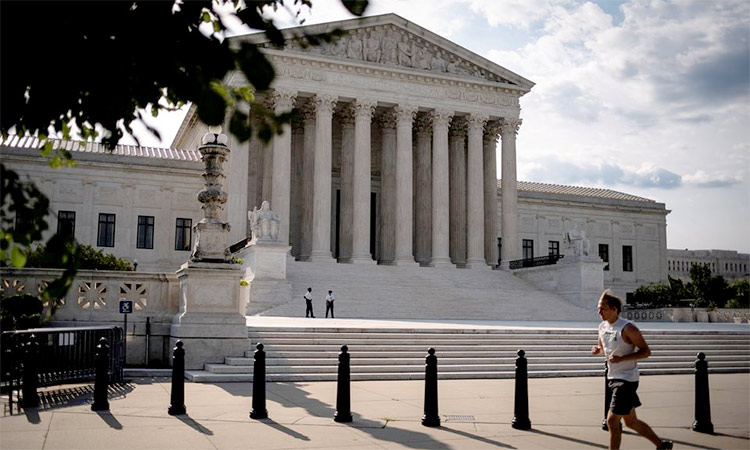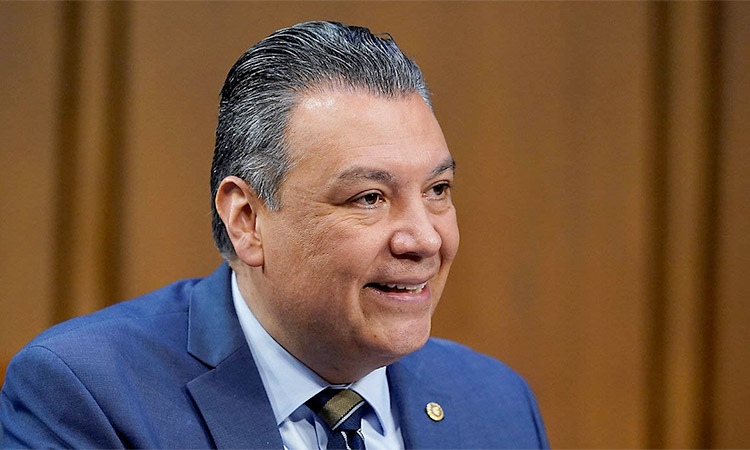How SC could kill a wealth tax before it’s been tried

The building of the US Supreme Court.
It’s getting harder and harder to pretend that the US Supreme Court is much more than an instrument to protect the wealth of America’s corporations and its richest citizens. The latest signal is the court’s decision to take a once-obscure tax case known as Moore v. United States. On its face, the case involves the objection by Charles and Kathleen Moore, Washington state residents who have objected to a $15,000 tax bill they received as investors in a small Indian corporation. But there’s much more at stake. The conservative anti-tax advocates backing the Moores are hoping to use the case to stifle the nascent movement in favor of a wealth tax on the richest Americans.
They’re explicit about that goal. “As efforts to design new federal tax systems with potentially troubling constitutional infirmities continue to pick up steam,” the conservative Manhattan Institute warned in one of two friend-of-the-court briefs it has filed to support the Moores, it’s up to the court to “clarify the limits of Congress’ taxing power before the train has begun rolling unstoppably down the hill.”
The anti-tax gang’s targets are proposals — by Sens. Bernie Sanders, I-Vt., and Elizabeth Warren, D-Mass., among others — to levy taxes on assets with accumulated value but undistributed gains, such as art, collectibles, real estate and stock and bond holdings that haven’t been sold. Warren’s proposal, which she aired in 2019 during a brief campaign for the presidential nomination, would have imposed a 2% tax on household net worth above $50 million and an additional 1% on fortunes of more than $1 billion. She estimated that it would bring in $2.75 trillion in revenue over 10 years.
“The Moore litigation ... may be a stalking horse to block billionaire and wealth taxes, which have been proposed, but not yet enacted,” wrote tax experts Reuven S. Avi-Yonah and Steven M. Rosenthal for the Tax Policy Center of the Urban Institute and Brookings Institution. The lawsuit doesn’t turn so much on whether income can be taxed, but on how to define “income.” The specific issue is whether it must be “realised” to become taxable. In other words, whether the definition applies only to income that has been paid out to recipients as something akin to cash. The plaintiffs and their supporters maintain that this was the understanding implicit in the 16th Amendment, which was ratified in 1913 and cleared the way for the income tax.
The government disputes that interpretation. In its filings, it points out that nowhere in the 16th Amendment is the concept of “realisation” mentioned. Indeed, the amendment refers to “incomes, from whatever source derived.” Previous rulings by the Supreme Court and appellate courts have held that income doesn’t have to land in a recipient’s pockets to be taxed. In an oft-cited 1940 Supreme Court opinion, for example, Justice Harlan F. Stone described the concept of realisation as an “administrative convenience,” and didn’t mean that a taxpayer could “escape taxation because he did not actually receive the money.” Any other interpretation, Stone implied, would invite large-scale tax evasion by allowing taxpayers to give away their right to a taxable payout by giving it away before pocketing it.
Indeed, that has long been seen as a flaw in our capital gains tax law. As the late tax expert Ed Kleinbard was fond of observing, the capital gains tax is our only genuinely voluntary tax because it’s levied only when capital assets such as stocks, bonds and real estate are sold — and a taxpayer can defer that occurrence indefinitely, even beyond death, while taking advantage of the asset by means such as borrowing against it. Under current rules, a capital asset bequeathed to an heir is revalued to its price at the time of the original owner’s death, extinguishing all tax liability incurred up to that point, forever. That tax break has helped create dynastic fortunes worth billions of dollars and is what motivates wealth tax advocates such as Sanders and Warren to capture the owed tax now, not later or even never.
Curiously, the immediate target of the Moore lawsuit is a Republican tax law — the Tax Cuts and Jobs Act passed by the GOP congress and signed by President Donald Trump in 2017. In general, the act delivered tax breaks to corporations and the wealthy estimated to be worth more than $1.5 trillion over 10 years. One provision wiped out all taxes on dividends taxpayers received from foreign companies controlled by Americans. The idea was to encourage Americans to bring home investment gains they had parked overseas — “stateless income” that Kleinbard estimated to be worth $1 trillion.
As a transitional step, the act imposed a one-time tax on those foreign earnings, albeit at a gratifying cut rate of only 9%, well below the top income tax rate of 39.6%. The Moores reported a gain of $132,512 from their investment in the Indian company, KisanKraft, paid $14,729, and filed their lawsuit, with the assistance of the Koch-affiliated Competitive Enterprise Institute, to obtain a refund. Their argument is that the one-time tax, known as the Mandatory Repatriation Tax, is unconstitutional. They say that’s because it’s not an income tax permitted by the 16th Amendment, since the taxpayers received no actual income. That’s the claim that the Supreme Court will consider after oral arguments scheduled for Dec. 5.
If the court overturns only the repatriation levy, that would cost the Treasury an estimated $340 billion — the sum it expects to collect over the 10-year period from 2018 to 2027. The court could also move more broadly to invalidate a host of provisions on unrealized income in the corporate and business tax systems, which could cost trillions of dollars. To even casual observers, it looks as if the fix is in for the Moores among the Supreme Court’s conservative majority. Start with Justice Samuel Alito. He was interviewed twice by one of the lead lawyers for the Moores, David B. Rivkin Jr., for two Wall Street Journal op-eds, including one that amounted to an unapologetic tongue-bath for the justice.
That article’s headline called Alito “the Supreme Court’s plain-spoken defender”; its text praised him for “a candor that is refreshing and can be startling” and essentially gave him 2,500 words to defend his rulings and ethics. Alito rebuffed demands from Democratic senators, among others, that he recuse himself in the Moore case, writing that Rivkin conducted the interviews “as a journalist, not an advocate.” Then there are Paul Singer and Harlan Crow, billionaires who notoriously have been vacation pals of Alito and Justice Clarence Thomas and “have their fingerprints all over this case,” as former Democratic congressional aide Alex Aronson and Bob Lord, a tax advisor to Patriotic Millionaires, an organization representing philanthropy-oriented plutocrats, commented in Slate.







